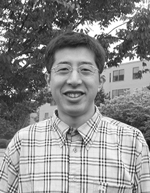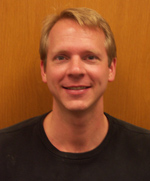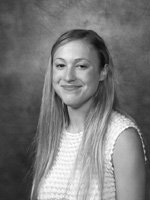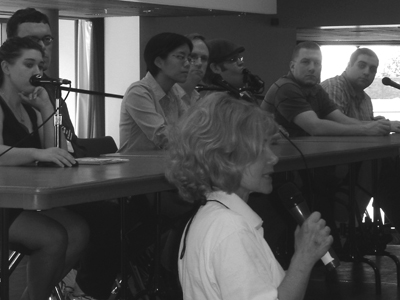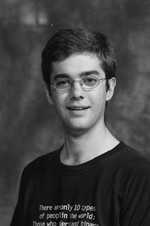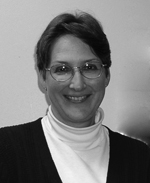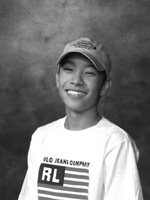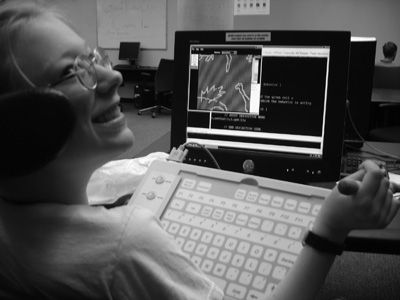Director's Digressions
Meet the 2007 Scholars:
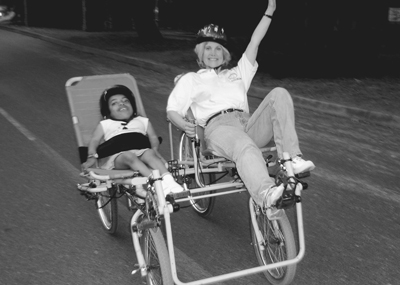
This summer DO-IT will host its annual Summer Study program for DO-IT Scholars. Primary funding for the DO-IT Scholars program is provided by the State of Washington. Additional funding for Scholar activities is provided by Microsoft, the National Science Foundation, and the Boeing Company. For information about DO-IT Scholars, consult www.washington.edu/doit/do-it-scholars.
We welcome the following '07 Scholars. All are residents of Washington and most will be sophomores, juniors, or seniors in high school this fall.
Heidi lives in Redmond. She enjoys school; her favorite classes overall are history and advanced technology. Heidi, who has Asperger syndrome, would like to learn Japanese, get a college degree in comparative literature, and someday write a book.
Robyn, who has hearing loss, lives in Lake Forest Park. Her two favorite subjects are science and math. Robyn has a goal of finishing high school with a 4.0 GPA and plans to go to college to major in physical therapy or sports medicine.
Ashlee lives in Poulsbo. She enjoys English and science and likes to learn about the earth and living things. Ashlee, who has a visual impairment, also finds writing to be a great form of self-expression. She plans to get her master's degree in psychology.
Blake, who has cerebral palsy, lives in Olympia. His favorite class is advanced band. Blake is a percussionist; he usually plays the bass. Blake plans to study forensic science.
Sara lives in Mountlake Terrace. Her favorite subjects are English (especially literature) and French. Sara, who has a visual impairment, plans to get a four-year degree and work in public relations.
Dylan lives in Langley. He received a Most Inspirational Student award this year. Dylan, who has a mobility impairment, enjoys math and Spanish. Dylan would like to go to college and study in an area where he can use both his social and computer skills.
Sam B. lives in Seattle. His favorite subjects are math and science, because they are both straightforward areas that have exact answers. Sam loves sports and plans to go to college. His ambitions include a career as a baseball or basketball coach or a sports announcer.
Corey R., who has a mobility impairment, lives in Snohomish. His favorite subjects are math (as he likes numbers and it comes easily to him) and history. Corey would like to become a game designer or developer.
Luke lives in University Place. His favorite subjects are science and math. Luke, who has attention deficit disorder (ADD), wants to become either a game tester or a marine biologist.
Peter lives in Walla Walla. His favorite subjects are math, science, and history. Peter, who has attention deficit hyperactivity disorder (ADHA) and obsessive compulsive disorder (OCD), would like to have a career creating computer software for the gaming and entertainment industries.
Stefani lives in Lamont. She has been involved in drama, sports, and honors band. Her favorite classes are German and geography, which help widen her views of the world. In college, Stefani would like to major in computer graphic design and minor in music.
Scott lives in Anacortes. His favorite courses are math and physical education. He enjoys all sports and is skilled at tennis, soccer, and bowling. Scott plans to attend Skagit Valley College and go into their Parks Services and Protection program.
Shyla, who has a mobility impairment and a learning disability, lives in Yakima. Her favorite classes include language arts and math. Shyla likes using her imagination to write creative stories, and she plans to go to college and find a career that uses her skills.
Megan, who has Tourette syndrome, is from Bellevue. Her favorite subjects are art and English. She enjoys reading and writing and is inspired by all forms of art. Megan wants to find an area of study and a career where she can use her talents and skills to help others.
Joshua lives in Raymond. His favorite subjects are math, literature, and history. One of his greatest passions is reading historical stories and poems. Joshua plans to get a degree in computer programming and become a video game designer.
Lukas, who has high-level Autism, lives in Selah. His favorite subjects are science and music. Lukas would like to graduate from college with a degree that allows him to work with animals.
Melissa lives in Woodinville. Her favorite classes are math and English. Melissa, who has a mobility impairment, enjoys reading, writing, and playing wheelchair basketball. She plans to get a degree in English and become an English teacher.
Cory M. , who has Asperger syndrome, lives in Poulsbo. Corey's two favorite classes are history and English. He would like to earn a Ph.D. in political science and work in politics.
Samuel M. lives in Kingston. His two favorite classes are social studies and math. Samuel has cerebral palsy and a learning disability. He plans to study aeronautical engineering and become a pilot.
We look forward to working with these teens during Summer Study 2007!
